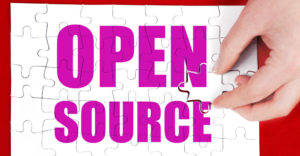“Bug #1 – Microsoft has a majority market share.” – Ubuntu bug tracker.
Much has changed since Canonical started on its quirky quest to “fix bug #1.” Seven years ago, Microsoft was seen as stagnant, ripe for plucking. Longhorn was still MIA, and Microsoft users were busy patching XP against the latest threats.
Apple? Apple was still recovering from its near-death experience. The iPhone and the first netbook (the Asus Eee PC) were still three years in the future. The iPad wouldn’t show up until 2010. If you had a computer, it was either a desktop or a laptop.
Great Expectations
MySpace had just been launched the previous summer, Facebook was just starting up, and Twitter was three years in the future. Still, demand for a free desktop OS that would let people do spreadsheets and work with these nascent online services without worrying about viruses must have seemed like an easy sell for a venture capitalist. By 2008, CEO Mark Shuttleworth was saying that he only expected Canonical to be profitable “within three to five years.” Yet profits remain elusive.
In the intervening years, Moore’s Law kept putting more computing power into smaller packages at lower prices. We saw netbooks come — and we saw netbooks go. Laptops displaced desktops as the biggest sellers, only to be increasingly supplanted by iPods, smartphones, and tablets.
Operating system vendors also adapted. Microsoft, stung by the backlash against Vista and user insistence on sticking with XP, came out with Windows 7 — the first Microsoft OS that took less memory than its predecessor. And Apple — well, Apple didn’t do much, if you don’t count parlaying the iPod, iTunes, and iPhone into becoming the most valuable company in the world, leaving everyone else to play catch-up.
And to top it all off, there was this weirdly named thing called “Android,” from Google of all people, another free Linux-derived OS, but targeted at all those new smart devices instead of the desktop.
All this gouged a huge hole in Canonical’s pre-iDevices plans for Ubuntu.
Time for Plan B
Venture capitalists pretty much always have an exit strategy. The usual trajectory is to build up a user base and revenues, then find a buyer or investors so they can “cash out.” What sort of exit strategy could Canonical envision with such a changed playing field? The desktop/laptop business, Ubuntu’s target, was becoming obsolete. Worse, from a venture capitalist point of view, it had lost its “shiny.” It was seen as old, stodgy, and boring.
Canonical’s response was a series of failed initiatives.
As the iPhone and iPad crazes nuked conventional wisdom about how people wanted to use computers, Shuttleworth decided that the future of Ubuntu lay in smart devices. Ultimately, he would sacrifice everything else to pursue this goal. Among those sacrificed would be the many users who had stuck by Ubuntu despite increasingly buggy releases.
The new mobile-centric user interface, Unity, provoked a lot of disunity among the existing Ubuntu user base, who were predominantly desktop and laptop users. Their complaints were ignored. The party line was “This (mobile+touch) is the future. Get over it.”
In retrospect, however, the most important failure was the “Android Execution Environment” (announced in May 2009, quietly dropped in 2010). Just how important this decision would be only became apparent at CES 2012.
Moore’s Law wasn’t done messing with Canonical just yet.
With the iPad selling for between US$500 and $1,000, a low-cost Linux-based device must have seemed to Canonical like a license to print money. Surely, that would be technology that investors would want a piece of.
And then Amazon came out with its own $199 tablet, complete with a virtual warehouse of content available from day one.
That had to hurt. In the space of a week, tablets became cheap commodities, and any potential Ubuntu devices would have to compete with Amazon not just on price but on content — and content is still king, whether your content is e-books and movies or a music or app store.
Plan C – or is it D, or F or LMNOP?
Canonical still had a backup plan for this year’s CES. The stakes were high. After failing to deliver on previous promises of OEM Ubuntu smartphones and tablets, Canonical needed to do something — anything — to salvage its credibility.
With no Ubuntu tablet or smartphone deals to demo, it quickly customized software from samygo.tv to release a half-baked UbuntuTV. There were lots of promises of what it would be like in the future, but what was missing was critical: There were no content deals. Without Android support, it was already obsolete the day it was announced, as Lenovo showcased an Android ICS TV at the same CES.
There’s no reason for a manufacturer to bother with UbuntuTV. Those who are not already using Linux can either modify the freely available samygo software themselves or use Android.
So where does that leave Ubuntu and Canonical? At best, Unity without Android support is currently relegated to the basest of bargain-basement devices, such as the $190 Ubuntu Webbook. Even this is not really attractive next to today’s sub-$200 Android tablets and smartphones.
‘You Can’t Get There From Here’
Given Canonical’s history of abandoned users and product announcements that come up short in execution, Shuttleworth’s most recent goal of 200 million users by 2015 doesn’t compute. There’s simply no path from “declining OS vendor” to “competing on an equal footing with Microsoft, Apple, and Google.” It’s the sort of rhetoric a CEO would say to rally the troops, but it’s become obvious that it’s already too late. Ubuntu users, many feeling betrayed, are migrating elsewhere.
If further confirmation were needed, the orphaning of Kubuntu to “focus on our core products” has that smell of death around it of a company reorganizing the deck chairs. The problem is that having damaged both the Ubuntu user base and the brand — what’s next?
Shark Tank
There are some serious issues standing in the way of Canonical regaining credibility. Imagine the reception Shuttleworth would receive if he were to appear on “Shark Tank” or “Dragon’s Den.” “How long have you been working on this? What were last year’s profits? Oh, there weren’t any? You’ve lost how much?!? Stop this madness! The market is trying to tell you something! Listen to it!”
As a venture capitalist, Shuttleworth should be hearing the same message from his own inner voice. There have been too many missteps, and now there is no realistic hope of recovery. Certainly, the rest of the world knows it. Every announcement Canonical makes of future greatness is greeted with open skepticism, and many of the once near-fanatical defenders of all things Ubuntu are now very vocal critics, evangelizing for “ABC”– Anyone But Canonical.
It’s Not Really About Android
“A bird in the hand is worth two in the bush.” Ubuntu could have stayed relevant if Canonical hadn’t tossed aside its user base to pursue Unity and tablets. Microsoft certainly knows the value of retaining users via backward compatibility. Apple provided a path for users during the switch from Power to Intel. Instead, Canonical blew off Ubuntu users to chase after the new “oh shiny,” resulting in Mint becoming the new Ubuntu.
Canonical is now just the latest example of how open source so effectively routes around damage. There will be no significant OEM deals, certainly none, giving Ubuntu 200 million users. There will be no UbuntuTV at your local big-box electronics store. Eventually, an unprofitable Ubuntu will be “Kubuntu’d” — left to the community to maintain.
Oh, and that Bug #1? Two years from now, when XP is mothballed, it’s a safe bet that XP will still have more users than Ubuntu ever had.
Addendum: Canonical’s latest announcement, Ubuntu running on an Atrix smartphone when docked, is old news. Here’s a video of Debian running on the same hardware last summer. No wonder even Matt Asay, Canonical’s former COO, is saying Canonical needs to focus on just one market.
For the curious, this was written using LibreOffice on Fedora 16.

















































Shuttleworth’s most recent goal of 200 million users by 2015 doesn’t compute IF you continue to hold fast to a mobile device POV.
If you start to look at it from a Cloud perspective and start to count up the potential number of lxc containers spun up with Cloud Foundry based PaaSes like ActiveState’s Stackato all running Ubuntu in little lxc containers – you could easily start to believe Shuttleworth will get close to 200 million Ubuntu users by 2015 – whether Cannonical can monetize these is another story.
Good for YOU!
You are to be HIGHLY commended for calling a spade a spade. Even journalists who I hold in high regard almost always wimp out with a phrase such as "…but Mark Shuttleworth is a sharp guy, and he’ll pull this off blahblahblah…".
Baloney. Pure horsefeathers.
Your title reminds me of a comment I posted warning Jane Silber that she’d better be negotiating a golden parachute now (6 mo. ago, or more), because the clock was ticking.
Your article also reminds me of another Ubuntu article comment, wherein I said that Canonical was late, Mark Shuttleworth was late, just as is the late Sir Winston Churchill.
One week later, Canonical announced that it would no longer fund Kubuntu.
It’s great to find a commentator/journalist/reporter (what do you call yourself?) with both knowledge AND guts.
Warmest regards…